My take on the sermon of Sunday, 8 February 2015 – 5th Sunday in Ordinary Time
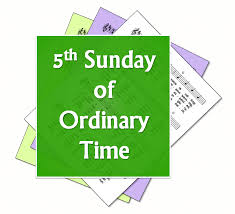 Jesus grasped her hand and held her up. “Simon’s mother-in-law lay sick with a fever. They immediately told him about her. He approached, grasped her hand, and helped her up. Then the fever left her and she waited on them” We should not allow sickness to pull us down, we should look up God and He will pull us up.
Jesus grasped her hand and held her up. “Simon’s mother-in-law lay sick with a fever. They immediately told him about her. He approached, grasped her hand, and helped her up. Then the fever left her and she waited on them” We should not allow sickness to pull us down, we should look up God and He will pull us up.
 Like Job we might think that life has lost it meaning because of what happens to us. The night drags on. As Christians we should see Jesus as the answer to Jobs Lamentations. He is looking for meaning in life. We can see the same in Peter’s mother-in-law case. They tell Christ about her. Christ heals her. This act of healing is an act of lifting her up and drawing her closer to God. Lets draw closer to God and get in contact with God.
Like Job we might think that life has lost it meaning because of what happens to us. The night drags on. As Christians we should see Jesus as the answer to Jobs Lamentations. He is looking for meaning in life. We can see the same in Peter’s mother-in-law case. They tell Christ about her. Christ heals her. This act of healing is an act of lifting her up and drawing her closer to God. Lets draw closer to God and get in contact with God.
Jesus is with us this morning in the Word and we will receive Him in Flesh. During Mass, we receive Christ in His Word, for He is the Word and we also receive Him in His Flesh and Blood. He tells us that this is My Body and this is My Blood. He does not say this represent My Body and My Blood. So any time we attend Mass, the greatest act of worship, we encounter and receive Christ our God Himself and we cannot return the same. What How does the woman respond, she waits on them. She is restored from uselessness to usefulness. She now has purpose in life. She responded by serving the God who healed her.
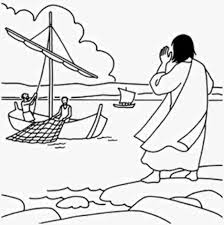 She served Jesus, He makes it clear that He is Available to us in time of need. John 10:10 “The thief cometh not, but for to steal, and to kill, and to destroy: I am come that they might have life, and that they might have it more abundantly”. So Christ came that we might have life and have it more abundantly.
She served Jesus, He makes it clear that He is Available to us in time of need. John 10:10 “The thief cometh not, but for to steal, and to kill, and to destroy: I am come that they might have life, and that they might have it more abundantly”. So Christ came that we might have life and have it more abundantly.
So all hear and they pour in, the Disciples say everyone is looking for You. We should also be seeking for the healing power of Christ in the Eucharist and in His Word. But lets not be like the people who came searching for Him for material things and healing only. Let come to Him for our salvation and redemption. So that where he is we also shall be.
Are we up to the task of serving God who does all things for us? This is the mission if the Church, Go therefore and make disciples of the world and proclaim the good news. There is on social media trending the interview of Mzbel who says she used to pray in tongues but her research shows that Jesus never happened it is like Horace that happened some 5000 years ago. Where are the Christians willing to defend the Word of Christ and prevent other gullible ones from falling.
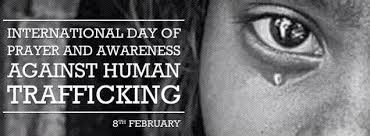 When the woman was sick she might have felt like Job did about the night. It is difficult feeling useless, those in prison, poverty, sick or constrained in any form. Feel same, Christians who are undergoing persecution under the hand of ISIS, Boko Haram, etc. So her healing results in a desire to serve God. Same as St. Paul response in the 2nd reading. When our lives are touched by Christ, the lest respond should not only be with gratitude but also with service, action, service in Christ. Paul says he is a slave to all; Service to God, to His people and His cause is the least expected of us who are called by His name.
When the woman was sick she might have felt like Job did about the night. It is difficult feeling useless, those in prison, poverty, sick or constrained in any form. Feel same, Christians who are undergoing persecution under the hand of ISIS, Boko Haram, etc. So her healing results in a desire to serve God. Same as St. Paul response in the 2nd reading. When our lives are touched by Christ, the lest respond should not only be with gratitude but also with service, action, service in Christ. Paul says he is a slave to all; Service to God, to His people and His cause is the least expected of us who are called by His name.
Let’s ask ourselves how are we being useful to God and His people. Are there people around us who need our help? Have we helped them? Are their business none of our business? We should mind the business of our God. Serve God in our neighbor. Let’s ask God to fill us with Holy Spirit so we will do the His business and be of service to our brothers in need.
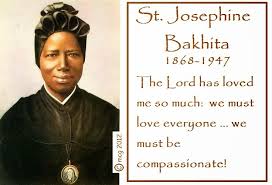 St. Josephine Bakhita was born in Sudan, Africa, in 1869. When she was a child, she was captured and sold as a slave and suffered harsh treatment. The name “Bakhita,” which means “fortunate,” was given to her in sarcasm by the people who kidnapped her.
St. Josephine Bakhita was born in Sudan, Africa, in 1869. When she was a child, she was captured and sold as a slave and suffered harsh treatment. The name “Bakhita,” which means “fortunate,” was given to her in sarcasm by the people who kidnapped her.
Bakhita was taken to Italy and put into service as a nanny. She was sent to live with the Canossian Sisters in Venice. From the sisters she learned about God and Christianity. In time, she asked to be baptized, and took the name Josephine.
At the age of forty-one, Josephine felt God calling her to become one of the sisters. The Canossian Sisters accepted her into their community. For twenty-five years, Sister Josephine carried out humble services in the convent. She cooked, sewed, took care of the chapel and answered the door. During World War I, Sister Josephine helped to care for the wounded. She became known for her kindness and goodness. She was a source of comfort and encouragement to everyone who came to her in need.
Someone once asked Sister Josephine how she would react if she ever met the people who had kidnapped her. She answered, “I would kiss their hands to thank them for giving me the chance to become a Christian and a sister.”
As Sister Josephine grew older, her health began to decline. She continued to live a life of loving kindness and faith even in sickness and pain.
As her death drew near, she said, “Why should I be afraid to die? Death brings us to God, and I love God and want to be with him.”
Sister Josephine Bakhita died at the age of seventy-eight. Her last words were “Our Lady! Our Lady!” She was canonized on October 1, 2000, by Pope John Paul II. St. Josephine is the patron saint of the Christian Sudanese people who still suffer persecution for their faith.
❦
Let’s learn from St. Josephine Bakhita to put our trust in God when we have problems or when we have something to suffer. God, who loves us without limits, can bring good even out of bad circumstances.
February 8 is also the feast of St. Jerome Emiliani.
LITURGY OF THE WORD
FIRST READING – Job 7:1–4, 6–7
Job spoke, saying:
Is not man’s life on earth a drudgery? Are not his days those of hirelings? He is a slave who longs for the shade, a hireling who waits for his wages. So I have been assigned months of misery, and troubled nights have been allotted to me. If in bed I say, “When shall I arise?” then the night drags on; I am filled with restlessness until the dawn. My days are swifter than a weaver’s shuttle; they come to an end without hope. Remember that my life is like the wind; I shall not see happiness again.
RESPONSORIAL PSALM – Psalm 147:1–2, 3–4, 5–6 (see 3a)
- Praise the Lord, who heals the brokenhearted. or R. Alleluia.
Praise the LORD, for he is good; sing praise to our God, for he is gracious; it is fitting to praise him. The LORD rebuilds Jerusalem; the dispersed of Israel he gathers.
He heals the brokenhearted and binds up their wounds. He tells the number of the stars; he calls each by name.
Great is our Lord and mighty in power; to his wisdom there is no limit. The LORD sustains the lowly; the wicked he casts to the ground.
SECOND READING – 1 Corinthians 9:16–19, 22–23
Brothers and sisters:
If I preach the gospel, this is no reason for me to boast, for an obligation has been imposed on me, and woe to me if I do not preach it! If I do so willingly, I have a recompense, but if unwillingly, then I have been entrusted with a stewardship. What then is my recompense? That, when I preach, I offer the gospel free of charge so as not to make full use of my right in the gospel.
Although I am free in regard to all, I have made myself a slave to all so as to win over as many as possible. To the weak I became weak, to win over the weak. I have become all things to all, to save at least some. All this I do for the sake of the gospel, so that I too may have a share in it.
ALLELUIA Matthew 8:17 R. Alleluia, alleluia.
Christ took away our infirmities and bore our diseases.
- Alleluia, alleluia.
GOSPEL – Mark 1:29–39
On leaving the synagogue Jesus entered the house of Simon and Andrew with James and John. Simon’s mother-in-law lay sick with a fever. They immediately told him about her. He approached, grasped her hand, and helped her up. Then the fever left her and she waited on them.
When it was evening, after sunset, they brought to him all who were ill or possessed by demons. The whole town was gathered at the door. He cured many who were sick with various diseases, and he drove out many demons, not permitting them to speak because they knew him.
Rising very early before dawn, he left and went off to a deserted place, where he prayed. Simon and those who were with him pursued him and on finding him said, “Everyone is looking for you.” He told them, “Let us go on to the nearby villages that I may preach there also. For this purpose have I come.” So he went into their synagogues, preaching and driving out demons throughout the whole of Galilee.
Lets have your comments below, we appreciate you taking your time to read and we will love to read & share your comments
This post has already been read 1196 times!
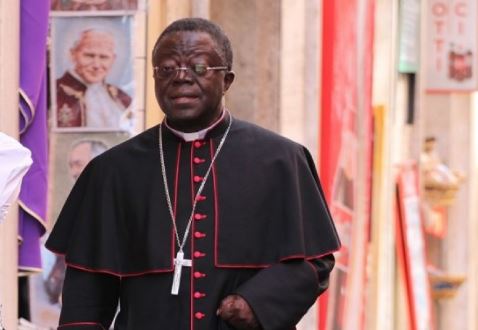
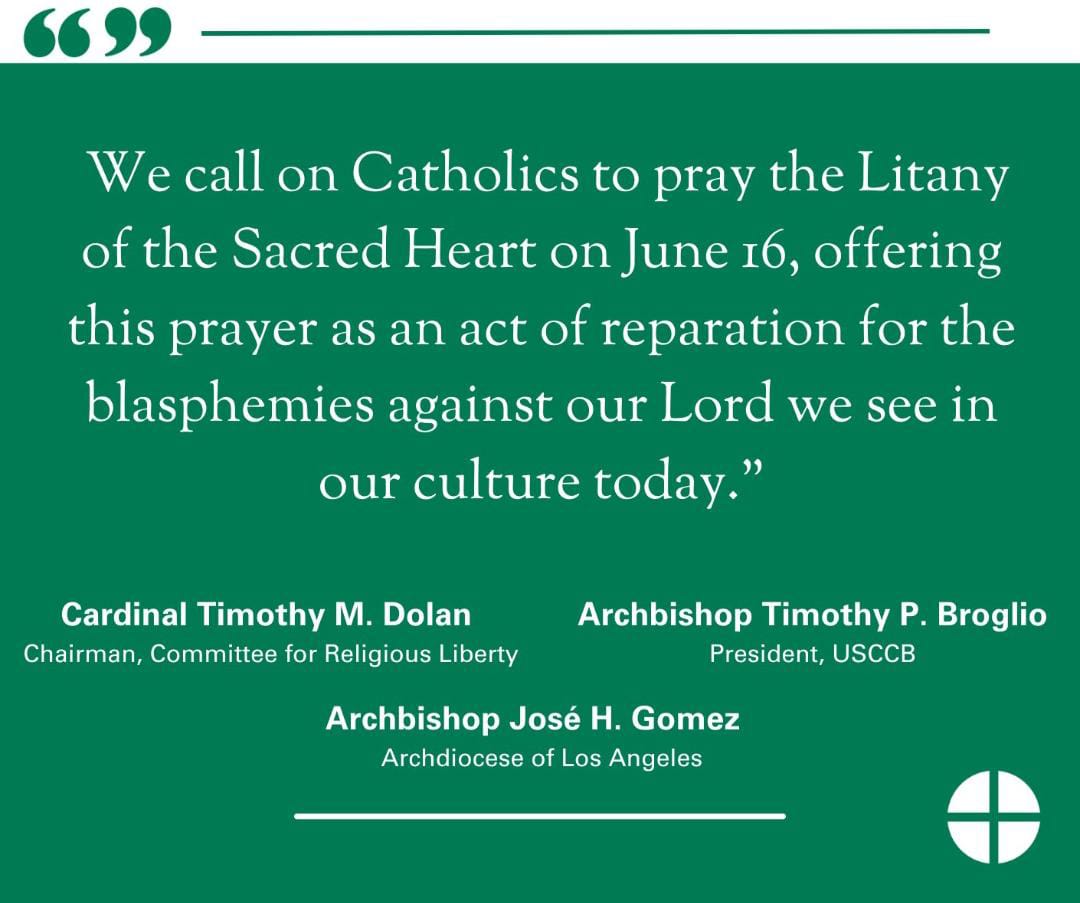
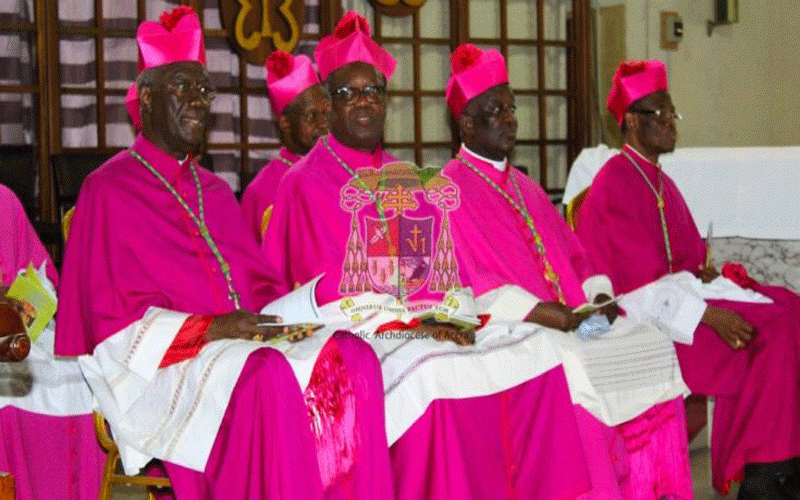

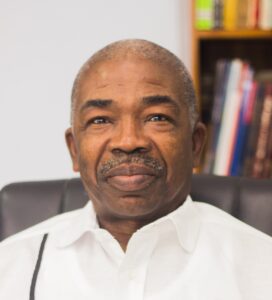
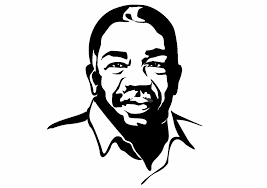

Post Comment